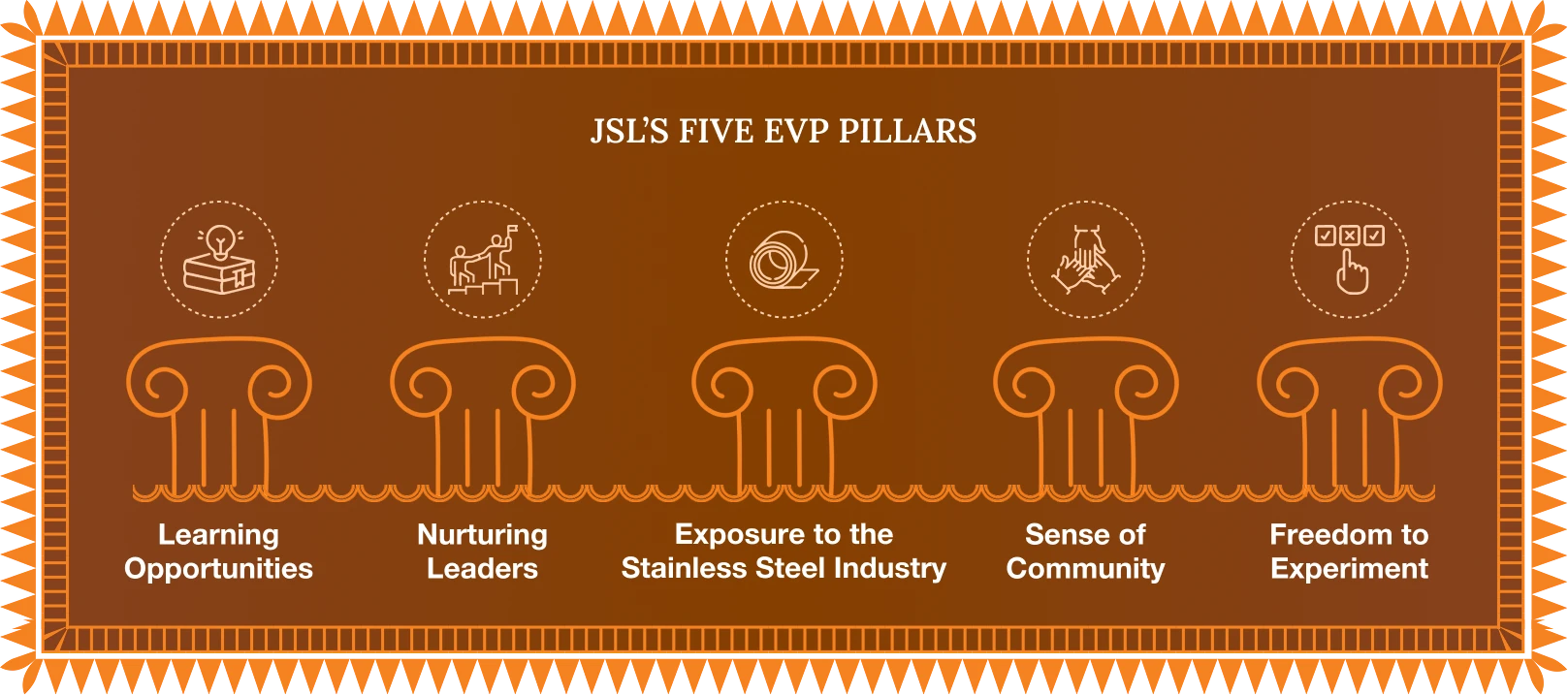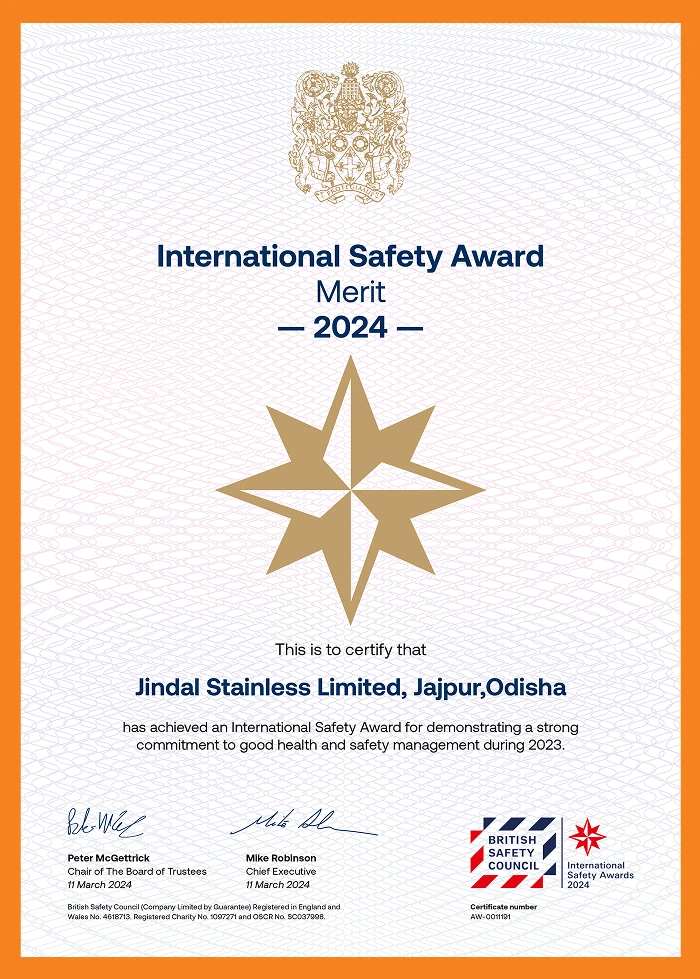Interplay of Capitals


Policies
SDGs


Jindal Stainless unequivocally champions its people – the most invaluable asset and the heartbeat of every endeavour it undertakes. The corporate ethos is meticulously built upon the foundational values of integrity, excellence, and profound care, principles that deeply inform the company’s approach to human capital. JSL recognises that the collective strength, diverse capabilities, and unwavering commitment of its talented workforce are the fundamental drivers behind the company’s sustained achievements and market leadership. In essence, the company fosters a culture forged in Indian values of resilience, innovation, and inclusivity, built for the evolving demands of global competitiveness.
The company’s strategic focus is intently set on cultivating an enriching and dynamic work environment that profoundly empowers every individual. This commitment extends beyond professional development; the company actively champions the holistic well-being of the entire team, championing a culture where every voice is heard and valued.

HUMAN CAPITAL MANAGEMENT
JSL’s workforce positions it as one of the largest employers in the Indian stainless steel sector. The company is committed to ensuring that every individual, irrespective of role or designation, has access to opportunities for skill development, safety, and personal growth.
During FY25, the company provided over 2,25,000 hours of training across areas such as health and safety, technical upskilling, leadership development, and ESG awareness. Furthermore, it continued to develop academia and industry partnerships, including sponsoring employees for programmes like M. Tech. Steel Technology from IIT Bombay, B.Tech. Process Engineering and M.Tech. Manufacturing Management from BITS Pilani, MBA from Shoolini University, B.Tech. Mechanical Engineering from GJU, Hisar, to cultivate a pipeline of skilled professionals ready for the future.
People-Centric Strategies for Long-Term Success
Strategic Talent Acquisition: Focused on recruiting individuals with the right skills and leadership potential from engineering and management institutes, as well as experienced professionals aligned with the company’s values of ethics, innovation, and sustainability.
Leadership Pipeline: Designed to attract and nurture future leaders to drive long-term growth.
Equal Opportunity Employer: Fair, unbiased, and inclusive hiring practices.
Diverse Talent Pool: Encouragement of employee referrals to enhance diversity.
Inclusive Culture: DEI is embedded across operations to foster collaboration, engagement, and productivity.
Gender Representation: Women currently represent 3.54% of the workforce, with emphasis on improving ratios at senior and board levels.
Respect & Empowerment: Every employee is valued and supported to reach their full potential.
Equitable Rewards: Transparent, merit-based compensation practices.
Supportive Policies: Maternity leave and daycare facilities to support work-life balance.
Objective Evaluation: Quarterly reviews and annual ratings based on merit.
Recognition Programmes: Celebrating contributions to diversity and inclusion.
Respect & Inclusion: Open communication and safe reporting channels.
Zero Complaints: No discrimination or complaints reported.
CSR Engagement: Promoting DEI through community initiatives.
Inclusive Communication: Emphasis on respectful, unbiased interactions.
Inclusive Infrastructure: Compliance with the Rights of Persons with Disabilities Act, 2016
Facility Enhancements: Ramps, touchless entry, and accessible design (excluding shop floors for safety)
Policy Access: Equal Opportunity Policy
Cultivating a People-Centric Growth Culture with Employee Value Proposition (EVP)
JSL’s remarkable journey of growth is intrinsically linked to the dedication and expertise of its people. Recognising the pivotal role employees play in its success, the company continuously invests in fostering a thriving workplace where careers are built with pride and work is driven by impact. A significant initiative in this regard was the launch of the new EVP campaign during the reporting period.
The campaign encapsulates the company’s five pillars of the EVP. The company’s EVP is built upon five fundamental pillars: providing continuous learning opportunities, actively nurturing future leaders, ensuring broad industry exposure, fostering a strong sense of community and belonging, and encouraging the freedom to experiment and innovate. These core elements define the unique and rewarding experience of working with JSL.
The EVP campaign leveraged real employee stories and authentic voices to illustrate how these pillars are woven into the company’s organisational DNA. Through an engaging video narrative featuring diverse team members – from young leaders to women in core manufacturing roles and innovators in advanced fields such as artificial intelligence – the campaign effectively showcased a vibrant workplace where personal growth and professional successes are directly linked to the company’s contributions to nation-building and global progress.
The visual shots cover JSL’s manufacturing sites, corporate offices, and community spaces. The video illustrates the manner in which the five pillars are embedded into the company’s operating fabric. It kicks off with an invitation to ambitious professionals and dives into the stories of young leaders, women in core manufacturing roles, innovators and pioneers in AI, and global collaborators. The EVP video was created by JSL’s agency partner Viral Rabbits and executed in collaboration with Mumbai-based Nine Angle Productions.
This initiative served not only to further engage JSL’s existing talent but also aimed to attract ambitious professionals who resonate with its values and vision for global leadership in stainless steel. It reinforced Jindal Stainless’ philosophy of creating an inclusive environment where employees are not merely contributors but also direct beneficiaries of the company’s growth and profitability, thereby fostering a dynamic ecosystem where dedication translates into shared prosperity.


Behind Every
Innovation, There’s a
Stainless Mind
at Work
At Jindal Stainless, employees are the driving force behind every innovation, every milestone, and every sustainable success. Their dedication, expertise, and passion power the company’s journey toward excellence and responsible growth.
The company prioritises employee experience through regular feedback and engagement tracking. The Employee Net Promoter Score (eNPS) survey helps us assess employee advocacy and sense of belonging. In FY25, the survey achieved a 70% response rate, with an eNPS score of 66%, placing the company in the top quartile among peer organisations.
JSL conducts eNPS surveys twice a year to understand the progress it has made towards its strengths, capabilities and ways of working, as well as ensuring that it is effectively moving forward and ready to take on the challenges of the next growth stage. The company’s performance is gauged against various drivers for job satisfaction and productivity. It assesses employee survey responses across key dimensions of workplace experience, including purpose, engagement and well-being. These insights guide JSL’s continuous efforts to enhance engagement, well-being, and organisational culture.
| Category (only JSL) | Total (FY25) | Male (No.) | Female (No.) |
|---|---|---|---|
| Permanent Employees | 5,420 | 5,175 | 245 |
| Non-Permanent Employees | 478 | 463 | 15 |
| Total Employees | 5,898 | 5,638 | 260 |
| Permanent Workers | 308 | 292 | 16 |
| Non-Permanent Workers | 13,221 | 12,631 | 590 |
| Total Workers | 13,529 | 12,923 | 606 |
Jindal Stainless has set an ambitious target to achieve an eNPS of 70% by 2030, reflecting its commitment to employee satisfaction and engagement.
Performance Reviews
and Employee Well-Being
Jindal Stainless follows a structured and transparent performance management process to support continuous growth and development. The company applies the SMART goal-setting framework – Specific, Measurable, Achievable, Relevant, and Time-bound – to ensure clarity and accountability in performance expectations.
Employees at and above the executive level participate in quarterly reviews via the Darwinbox HRMS platform, enabling real-time goal tracking and feedback. For employees below the executive level, annual appraisals are conducted using a management-by-objectives approach. This is complemented by a continuous performance management culture, where regular 360-degree feedback and open conversations between managers and employees are encouraged throughout the year. Managers are expected to provide timely, constructive feedback, while employees are empowered to proactively seek input to support their development and performance improvement.
Workplace Stress Management
To further enhance employee well-being, the company hosts weekly virtual Utthaan sessions focused on mental health, in collaboration with external experts. Corporate employees can clock in between 9:00 and 10:00 am, with a 15-minute grace period available four times a month, and two short leaves of up to 90 minutes each month.
Sports and Health Initiatives
Jindal Stainless actively promotes employee well-being and work-life balance through a range of sports and health-focused programmes. Regular sports tournaments foster team spirit and physical fitness, while flexible working hours and short leave options support mental well-being and personal time.
Learning and Development
Empowering people through continuous learning is key to building a future-ready workforce. Jindal Stainless’ Learning and Development (L&D) framework is built on a foundation of skill enhancement, personalised growth, and leadership development at all levels. Learning methods offered for employee development encompass both coaching and mentorship initiatives, prominently featuring the Prerna mentoring programme. This programme, designed to empower growth and foster connections, pairs experienced industry mentors with young management trainees and selected high-potential employees to cultivate a culture of continuous learning and professional development.
In addition, collaborative learning is encouraged through teams and networks, facilitating knowledge sharing and support across the organisation. These include structured group interactions and networks aimed at enhancing interpersonal connections and collective growth. The company places strong emphasis on career management and employee development by offering structured training programmes, continuous learning opportunities, and clear career progression pathways to support professional growth and skill enhancement.
Prerna
JSL’s structured mentoring programme is designed to drive growth, foster learning, and build a culture of collaboration. It pairs experienced industry professionals as mentors with Management Trainees and selects individuals from the Talent Pool and Succession Pipeline. In partnership with SHRM, the Talent Management team facilitates the first five mentor-mentee interactions over a three to four-month period, ensuring a strong start and meaningful engagement. The programme reflects the company’s commitment to nurturing potential and embedding mentoring into its fabric.
Step-Up
This leadership development suite is designed to empower leaders at all levels to sharpen their skills, develop authentic leadership styles, and foster collective growth. Rooted in JSL’s core values and behavioural competencies – personal effectiveness, interpersonal effectiveness, and business effectiveness – the programme promotes a culture of innovation and high performance. It includes targeted interventions aligned to career transitions:
iStep-Up: For first-time managers transitioning into leadership roles (Manager grade) – launched in FY25.
Step-Up 1: For mid-level leaders advancing to AGM grade – launched in FY25. Together, these programmes aim to build a strong leadership pipeline aligned with JSL’s growth ambitions.
Aarohan
As part of its digital transformation journey, JSL conducts regular skill gap assessments to identify evolving capability needs. Through its digital learning platform Aarohan, the company delivers targeted training interventions aligned with emerging industry trends. The programme focuses on building future-ready competencies, including cybersecurity, artificial intelligence, and other in-demand digital skills, enabling JSL’s workforce to stay ahead in a rapidly evolving landscape.



JSL and CGSSC launch Handbook to Benefit 20 Lakh Houseware Workers Nationally
In collaboration with the Capital Goods & Strategic Skill Council (CGSSC), the company has introduced a specialised Participant Handbook and Qualification Pack titled ‘Operator – Stainless Steel Kitchenware Manufacturing’. This initiative is designed to benefit nearly 20 lakh workers engaged in the houseware sector across India. The handbook serves as a formalised training tool under the Skill India initiative. It provides structured guidance on stainless steel kitchenware manufacturing processes, safety standards, and quality benchmarks. The content is aimed at helping workers, both new entrants and existing artisans, enhance productivity, reduce material wastage, and maintain consistency in product quality. By codifying best practices, the handbook aims to address skill gaps in the informal and unorganised segments of the houseware industry. It is intended for use across training institutions, self-help groups, and manufacturing clusters, enabling scalable and standardised upskilling efforts. This effort complements broader workforce development initiatives led by JSL, including those through the Stainless Academy. By focusing on structured knowledge transfer and workplace safety, the initiative supports long-term capacity building and improved livelihoods in one of India’s largest stainless steel application segments.
JSL actively promotes internal mobility through structured job rotation programmes. These initiatives are designed to broaden employees’ skill sets, enhance cross-functional understanding, and provide exposure to diverse areas of the business. Each rotation is aligned with an individual’s development plan and career aspirations, ensuring a personalised growth journey.
All training modules, including functional, behavioural, and leadership sessions, are extended to workers. These include additional modules on safety, environment, quality, and sustainability, ensuring a culture of operational excellence and awareness at all levels. The L&D team continually identifies training needs, develops tailored programmes, and monitors outcomes to ensure that every employee is equipped to grow with the organisation and contribute meaningfully to JSL’s journey.
Jindal Stainless upholds a zero-tolerance policy against harassment and discrimination. In line with the PoSH Act, the company has a dedicated Internal Committee at each location, a whistleblower mechanism, and strict confidentiality protocols to address complaints. Mandatory monthly PoSH training and regular awareness sessions ensure all employees are informed and empowered. During FY25, the company received a total of five complaints under the PoSH Policy. Of these, three were resolved/disposed off during the financial year while two were subsequently resolved on April 30, 2025, reflecting the company’s commitment to a safe and respectful workplace.
Training across Technical and ESG Competencies
In FY25, JSL delivered over 1,93,652 hours of training to over 5,000 employees, reinforcing its commitment to holistic workforce development. On average, each employee received nearly 33 hours of training, covering a wide range of technical and ESG competencies. These trainings were both technical and ESG-related competencies, customised for various functions.
Employees received skill development in areas such as material handling, equipment operation, and process optimisation. These were supported by modules on quality control, time management, and leadership development. On the ESG front, training covered environmental management, responsible sourcing, ethics, anti-bribery and anti-corruption practices, and sustainability principles. For workers, classroom and field-based sessions addressed process control, TPM, communication skills, hazard identification, and emergency preparedness. ESG topics were embedded into operational trainings, covering waste management, energy use, and compliance with ethical conduct policies.
In addition to technical training and workshops, JSL has introduced dedicated sessions on sustainability, covering themes such as waste-to-wealth. These initiatives aim to strengthen both the professional capabilities and environmental consciousness of the company’s workforce. In FY25, all new hires received sustainability training as an integral part of their induction programme.
Campus Hire Programmes
Arize Biz
1-year journey of MBA and CA campus hires. Trainees are exposed to corporate functions and plant operations through assigned projects and educational online courses.
Arize Tech
1-year journey of BTech and MTech campus hires. Trainees are exposed to the overall manufacturing and also the function they are a part of.
Arize GenNXT
2-month internship for various B-schools and engineering graduates. The programme is designed to give them an understanding of the organisation and the function while working on real-time projects.



NURTURING EXCELLENCE: JSL’S STRATEGIC INDUSTRY-ACADEMIA COLLABORATION
Jindal Stainless recognises that the calibre of its Human Capital is paramount to sustaining its leadership and driving future innovation. Central to this philosophy is its focus on industry-academia collaboration, exemplified by the fully-sponsored MTech programme in Steel Technology, launched in partnership with the prestigious IIT Bombay. This unique initiative, now in its second successful batch, underscores JSL’s commitment to continuous learning and to equipping employees with advanced skills, thereby maintaining its competitive edge in delivering sustainable solutions for the global stainless steel industry. This rigorous, two-year programme is meticulously designed to deepen employees’ expertise in advanced iron and steel-making technologies, ensuring they remain at the forefront of industry innovations. With stringent eligibility criteria, including a BTech degree in mechanical engineering and metallurgy and a proven track record within JSL, the company is cultivating a highly specialised group of professionals. The programme is already yielding tangible benefits, with 11 employees currently enrolled and the first batch actively engaged in their thesis projects. Upon successful completion, these graduates are considered for strategic job rotations, allowing their newly acquired knowledge to directly enhance efficiencies across JSL’s manufacturing processes and inspire innovative solutions for optimising quality, cost, and emissions. This investment is fundamental to developing the highly-skilled professionals who will propel JSL and the broader Indian stainless steel industry to new heights.
Compensation and Benefits
JSL’s compensation strategy is benchmarked against industry standards to attract, retain, and grow top talent. The company offers a balanced mix of competitive base pay, performance-linked incentives, and rewards aligned with individual and organisational goals. This approach fosters a culture of high performance, accountability, and sustained growth.
Competitive
Remuneration
Fair compensation to attract and retain the talent we need.
Performance-Linked
Compensation
To ensure transparency and balance between performance and remuneration, adhering to acceptable benchmarks.
Balanced Compensation Framework
(Balanced Remuneration)
For directors, Key Management Personnel (KMPs), and senior management demonstrate a well thought out mix of fixed and incentive-based components to reflect short-term achievements and long-term contributions, aligning with individual performance trajectories.
Benefits
- Group Medical Insurance
- Group Personal Accident Insurance
- Group Term Insurance
Retirement Benefits
- Group Medical Insurance
- Gift Retiral Reward from JSL Welfare – Max. INR 1 lakh
- Same Day Full and Final Settlement
Worker facilities at Sites
- Canteen Services
- Labour Accommodation

Empowering the Workforce
Through Employee Stock
Option Schemes
Recognising their employees’ unwavering commitment and integral role in JSL’s growth journey, the company consistently implements strategies to foster a culture of ownership, drive performance, and ensure mutual value creation for all stakeholders. A key initiative in this regard is the comprehensive Employee Stock Option Scheme (ESOS). During the reporting period, the company reinforced its commitment to talent recognition and retention through the grant of stock options to eligible employees under the company’s established ESOS. This grant comprised an equal mix of Employee Stock Options (ESOPs) and Restricted Stock Units (RSUs), which were offered at a discounted price to employees. This move built upon previous grants, underscoring a continuous commitment to rewarding the company’s workforce.
These stock options are designed with a four-year vesting period and are explicitly linked to individual and collective performance conditions, ensuring that rewards are intrinsically tied to demonstrated contributions and the company’s overall success. Jindal Stainless’ ESOP framework is a testament to its philosophy of creating an inclusive environment where employees are not merely contributors but also direct beneficiaries of the company’s growth and profitability. This fosters a dynamic ecosystem where dedication translates into shared prosperity, contributing to JSL’s long-term organisational resilience and performance.
HUMAN RIGHTS
Jindal Stainless prioritises upholding and respecting human rights across its operations and supply chain. The company adheres to internationally recognised standards, ensuring fair labour practices, non-discrimination, and the protection of workers’ rights. Its policies promote dignity, equality, and ethical treatment for all individuals associated with the business.
The primary objectives behind extending
these stock options are multifaceted:
Rewarding
performance
and commitment
The grants serve as a tangible recognition of the company’s employees’ dedication, performance, and significant contributions to its organisational achievements.
Attracting and
retaining
top talent
By offering a direct stake in the company’s success, JSL aims to attract and secure high-calibre professionals within a competitive talent landscape.
Fostering a
sense
of ownership
Empowering employees with equity ownership instills a deeper sense of responsibility and aligns their long-term interests directly with the company’s strategic objectives and shareholder value creation.
Driving engagement
and motivation
When employees share in the company’s prosperity, it cultivates enhanced engagement, heightened motivation, and stronger loyalty, collectively building a more formidable organisation.
Respect at the Core: Safeguarding Human Rights across the Value Chain
Jindal Stainless has a Human Rights Policy to uphold and respect human rights as per the internationally accepted standards on human rights (such as the International Labour Organisation [ILO], Declaration on Fundamental Principles and Rights at Work, the United Nations Guiding Principles on Business and Human Rights, and the United Nations Global Compact). The responsibility for upholding human rights, preventing involvement in any human rights violations, and ensuring effective grievance redressal lies with the respective Department Head and the Chief Human Resource Officer. They are accountable for establishing and maintaining mechanisms to address and resolve concerns raised by affected stakeholders.
Furthermore, the company has a human rights due diligence process (HRDD) in place, covering all permanent and contractual employees. This includes risk assessments and the implementation of policies like the Whistleblower Policy, Workplace Ethics Policy, and the Supplier Code of Conduct, which mandates compliance on issues such as child labour, forced labour, fair wages, non-discrimination, and safe working conditions.

The policy covers the following aspects:
- Human trafficking, child labour, forced and compulsory labour
- Freedom of association and collective bargaining
- Discrimination and harassment
- Equal opportunity
- Safe and healthy working conditions
- Equal/ fair remuneration

Human Rights
Risk Assessment (HRRA)
In FY25, the company conducted a comprehensive Human Rights Risk Assessment of its operations, including the contractors and suppliers (Tier-I), covering 100% of the scope. 100% of JSL’s plants and offices were assessed by a third party for human rights risks across categories, including child labour, forced labour, sexual harassment, workplace discrimination, and wage practices.
The company evaluates risks based on scale, scope, irremediability, and likelihood, resulting in an Inherent Risk Rating. It then assesses management readiness, including policies, grievance mechanisms, stakeholder engagement, and monitoring capacity to assign an Overall Management Rating. The resulting combined assessment yields a Residual Risk Rating, pinpointing high- and medium-risk areas requiring remediation.
100% of JSL’s plants and offices were assessed by a third party for human rights risks across categories, including child labour, forced labour, sexual harassment, workplace discrimination, and wage practices.
| Risk Topic | Scale (Level of potential harm caused) | Irremediability (Degree of non-cureability) | Scope (%age of people impacted) | Severity (Scale + Irremediability + Scope) | Likelihood (Probability of Rights Violation) | Inherent Risk (Severity + Likelihood) |
|---|---|---|---|---|---|---|
| Discrimination and DEI | Low | Low | Very High | Medium | Medium | Medium |
| Working Hours and Working Conditions | High | Medium | Medium | Medium | Medium | Medium |
| Harassment | High | High | Very High | Very High | High | Very High |
| Child Labour | High | High | Low | Medium | Low | Medium |
| Forced Labour / Bonded Labour | High | High | Low | Medium | Low | Medium |
| Freedom of Association | Medium | Medium | Very High | High | Low | Medium |
| Minimum Wage Payments | Medium | Medium | Very High | High | High | High |
| Worker Health & Safety | High | High | Very High | Very High | High | Very High |
| Grievance Redressal | Medium | Medium | Very High | High | Medium | High |
| Security Forces | High | High | Medium | High | Medium | High |
| Supply Chain Impact | Medium | Medium | High | High | Medium | High |
| Corruption & Bribery | Low | Medium | Medium | Medium | Low | Medium |
| IPS and Local Community Impact (Policy Level) | High | Medium | Medium | High | High | High |
| Stakeholder Engagement Plan | High | Medium | Very High | High | High | Medium |
| FPIC in Policy Commitment (IP and Communal Property) | High | Medium | Medium | Medium | Medium | Medium |
| Resettlement | High | Medium | Medium | Medium | Medium | Medium |
As part of its broader social performance commitments, Jindal Stainless conducted human rights training for 100% of its workforce during FY25. A total of 5,898 employees and 13,529 workers, including contractual staff, were trained in the company’s human rights policies and expectations. These sessions covered key topics such as non-discrimination, prohibition of child and forced labour, fair wages, occupational safety, and dignity at the workplace. Human rights training is integrated into the company’s compliance and ethics programmes to ensure consistent awareness across all levels of the organisation. These initiatives are aligned with international frameworks, including the UN Guiding Principles on Business and Human Rights and ILO conventions.
Jindal Stainless is committed to upholding the highest standards of ethical conduct and employee well-being, and aims to maintain zero human rights violations across all its sites and locations by 2030.
Human Rights Mitigation and Remediation
Jindal Stainless Limited has proactively developed mitigation strategies to address the identified human rights risks. The company has covered 100% of its operations with all identified risks assessed, along with mitigation measures taken. Some of the strategies that are currently ongoing or already implemented include key measures such as the enforcement of anti-discrimination policies, PoSH training for all permanent employees, the establishment of Internal Complaints Committees (ICCs), and plans to extend training to contractual workers. The company has also advanced its Diversity & Inclusion agenda by setting SMART diversity metrics, conducting unconscious bias training, and ensuring equal opportunity practices. These efforts are supported by accessible grievance redressal mechanisms, reinforcing JSL’s commitment to ethical and inclusive business conduct.
JSL’s deep commitment to upholding human rights extends fundamentally to the management and supervision of its security operations. JSL maintains absolute zero tolerance for any human rights violations throughout the organisation and its value chain, ensuring that security practices are conducted with the utmost responsibility and ethical integrity. The company’s approach is designed to safeguard the well-being of all individuals connected to its operations, including employees, workers, and local communities.
The company employs a framework for managing security forces, built upon proactive measures and stringent due diligence. JSL conducts regular threat, vulnerability, and risk assessments to identify potential risks to the company and its personnel, meticulously utilising these findings to implement appropriate security measures and prepare for potential incidents. The company’s internal due diligence processes, which cover all permanent and contractual employees, are benchmarked against global best practices and focus on identifying vulnerable areas and implementing effective remediation measures. This includes stringent anti-child labour policies, age-verification processes prior to onboarding, and identity checks at all entry and exit points. Also, the company embeds zero-tolerance clauses for child and forced labour within contracts with all employment and recruitment agencies, as well as other external providers of workers, ensuring JSL’s principles are upheld across its entire value chain.
Furthermore, the company’s engagement with security personnel is characterised by close collaboration, clear guidelines, and vigilant oversight. It works closely with public and private security forces, including local authorities, with well-defined protocols governing these interactions. An effective system is in place for monitoring the activities of all security forces, ensuring their compliance with the company’s policies and procedures through regular interactions, briefings, and inspections. Moreover, JSL conducts frequent and thorough audits and assessments of all security contractors, evaluating their resources, training, qualifications, job performance quality, and adherence to environmental, safety, and statutory compliances. This rigorous evaluation ensures their ongoing effectiveness and alignment with JSL’s high standards.
To reinforce accountability and transparency, Jindal Stainless has established structured and accessible grievance mechanisms for employees to report concerns related to security forces. These concerns can be escalated through established channels, from direct supervisors to departmental heads, and, if necessary, to a dedicated Grievance Resolution Committee. The company’s broader commitment to human rights ensures that all employees and off-roll workers receive comprehensive training on human rights policies, promoting a culture of respect and fairness across all levels of its operations. It maintains rigorous processes to receive and address grievances related to human rights issues, overseen by a work committee of cross-functional heads and a grievance tracker to monitor complaints and their resolution effectively. This robust framework underpins JSL’s dedication to preventing human rights abuses and fostering a respectful environment for all stakeholders.
JSL acknowledges and upholds the distinct cultural heritage and inherent rights of Indigenous Peoples (IP) within its operational spheres. The company’s commitment is rooted in national regulations and aligned with international best practices, ensuring a responsible and inclusive approach to managing its operational impact. When situations necessitate Resettlement and Rehabilitation (R&R) due to expansion or infrastructure development, the company manages these processes with the utmost respect for the affected communities. This involves fair, inclusive, and transparent engagement, consistently prioritising their long- term well-being and striving for their Free, Prior, and Informed Consent (FPIC) before any project-related activities commence.
JSL’s framework guides its actions to safeguard the dignity and cultural identity of Indigenous Peoples. The company undertakes detailed early assessments to identify and prevent potential adverse social, cultural, and environmental impacts. Where impacts are unavoidable, JSL applies a robust mitigation hierarchy to address them effectively. The company’s commitment also extends to ensuring fair and equitable R&R processes, which include transparent compensation mechanisms and substantial support for sustainable livelihoods and community development initiatives. The company also ensures that all employees interacting with Indigenous Peoples receive specialised training for effective engagement and issue resolution. The implementation is diligently overseen by JSL’s ESG and CSR committees, with periodic reviews to align with evolving national and international standards.
JSL upholds and safeguards employees’ rights to freedom of association and collective bargaining, in line with applicable local laws. The company recognises that constructive and transparent dialogue between employees and management is vital to building an inclusive and respectful workplace culture.
To support this, the company maintains consistent engagement with employee representatives across its manufacturing locations, ensuring that concerns are heard and addressed in a timely manner.
In FY25, out of 5,420 permanent employees, 571 (10.54%) were affiliated with associations or unions. Among permanent workers, 137 (44.48%) out of 308 were union members.
JSL has established a comprehensive grievance redressal system that is accessible to all employees and workers. The process begins at the site level, where individuals may raise concerns through their immediate supervisor and escalate to the Head of Department (HOD) if required. If the matter remains unresolved, it is referred to the Grievance Resolution Committee, a four-member panel comprising representatives from both management and workers, which reviews the issue and advises management on the appropriate course of action.
Grievances involving the ombudsperson are directed to the Chairperson of the Audit Committee for an impartial investigation. Employees and workers also have the option to report matters directly to the Chief Human Resource Officer. Further, Sampark, a dedicated platform, enables direct interaction between employees and the Managing Director. It is organised by the top management to ensure the implementation of two-way communication sessions between employees and management, while indicating that these sessions have or are taking place.
To strengthen accountability and trust, the company’s Code of Conduct and Whistleblower Policy offer additional reporting avenues. Employees and workers are encouraged to raise concerns with their managers, HR, or senior leadership. Complaints are also accepted via email at whistleblower@jindalstainless.com. The identity of the subject shall be kept confidential to the extent possible and subject to legitimate needs of statutory law(s)/investigation(s).
There were no instances of whistleblower complaints in FY25.
As an equal opportunity employer, the company ensures that its recruitment practices are fair, unbiased, and inclusive, attracting a diverse pool of qualified candidates for all roles. JSL encourages employee referrals to bring in talented individuals from varied backgrounds. The company’s hiring strategies are designed to attract talent with commitment and drive those with the potential to emerge as future leaders for its business.
JSL hires graduates from top engineering and management institutes as well as experienced professionals who embody the company’s commitment to ethics, innovation, and sustainability, ensuring it brings together the best minds to write the next chapter of growth for JSL.
The OPJEMS scholarship, instituted in honour of Shri O P Jindal, recognises academic and leadership excellence among students from India’s premier institutes. In FY25, 100 students from 43 leading institutions, including IITs, IIMs, XLRI, NITs, and MDI, were awarded scholarships.
The selection process saw participation from 1,345 students, evaluated through business proposals, assessments, and interviews. Since its inception, the programme has supported over 1,500 scholars, reinforcing JSL’s commitment to fostering innovation, entrepreneurship, and future-ready talent.
In 2024, Jindal Stainless launched the ‘Rise Like A Woman’ programme in collaboration with an HR consultancy, reaffirming the company’s commitment to empowering women through modern learning and development. This four-month initiative is designed to prepare high-potential female professionals for managerial roles by addressing traditional gender barriers.
The programme includes a structured digital learning journey, 360-degree feedback, live masterclasses, assessments, and mentoring by women industry experts. Since its launch, women participants have been recognised as part of the company’s broader ‘1000 Women Leaders Programme’, focused on building a strong pipeline of women leaders across the organisation.
Jindal Stainless has committed to achieving at least 8% representation of women in its workforce by 2030, as part of its broader diversity and inclusion agenda.
DIVERSITY, EQUITY,
AND INCLUSION
JSL goes beyond investing in its people by investing in their potential. By supplementing the workforce with the right tools, environment, and values, the company is shaping a resilient organisation equipped to meet the challenges of tomorrow. The company is committed to cultivating a more inclusive workplace.
The company is committed to cultivating a more inclusive workplace. The company acknowledges diversity, equity, and inclusion (DEI) are fundamental to building an engaged, collaborative and productive workplace. A vibrant mix of diverse perspectives, backgrounds, and experiences is proven to contribute to better decision-making and financial performance, driving returns above the industry median. JSL is committed to ensuring gender diversity at the senior management, leadership positions and Board of Directors level – currently, women account for around 4% of the employee population. The company’s DEI approach is embedded across all facets of its operations, reflecting its commitment to creating an environment where every individual feels valued, respected, and empowered to reach their full potential.
As of March 31, 2025, three out of eleven Board members at JSL are women, representing 27.27% of the total Board composition. This surpasses the regulatory requirement for listed companies and reflects the company’s commitment to fostering gender diversity at the highest level of governance. Increased female representation at the Board level strengthens strategic oversight, enhances inclusivity in decision-making, and supports the broader vision of balanced and representative leadership.
Enhancing Women Leadership:
Defying Gender Norms Through ‘Flip the Script’
Jindal Stainless acknowledges the persistence of subtle yet pervasive gender biases and stereotypes within workplaces, particularly in traditionally male-dominated industries such as manufacturing. Recognising its responsibility to foster an equitable and inclusive environment, the company decided to actively challenge these preconceived notions and drive a cultural shift.
To address this issue, the company launched the ‘Flip the Script’ video campaign on International Women’s Day. The objective was to highlight and dismantle gender-specific stereotypes by compellingly demonstrating their absurdity. The campaign specifically aimed to showcase scenarios where men encountered questions and expectations typically reserved for women, thereby making the inherent biases visible and prompting reflection. For instance, the video portrayed men being asked about balancing work and family life or facing questions about their marital status during job interviews, situations commonly experienced by women.
Their evident discomfort and confusion served as a potent mirror, highlighting the often-unnoticed everyday biases women face. The video concluded with a direct call to action, encouraging viewers to ‘flip the script’ on gender stereotypes.
This initiative aimed to spark crucial conversations about gender equality, break down stereotypes, and encourage the adoption of more inclusive practices across workplaces. By holding a mirror to these biases, the company sought to foster an environment where talent and potential define an individual’s contribution, irrespective of gender. The campaign reinforced its commitment to attracting and empowering female talent, particularly in core manufacturing roles, and continues to drive JSL’s broader agenda for a truly equitable workplace where every employee feels valued and respected.
Fostering a Healthy and Inclusive Workplace Environment
A healthy and inclusive workplace is fundamental to sustaining long-term employee engagement and organisational excellence. The company fosters a work culture where physical well-being, mental health, emotional resilience, and mutual respect are prioritised equally. Through structured health and safety programmes, diversity-focused initiatives, leadership development, and open communication channels, JSL ensures that every individual feels valued, heard, and supported.
Inclusion is embedded into everyday practices, whether through equitable hiring policies, training for differently abled employees, or platforms that encourage cross-functional collaboration and dialogue. The focus extends beyond compliance, aiming to build a work environment that is not only safe and productive but also empathetic and forward-looking. The company complies with the Rights of Persons with Disabilities Act, 2016, and has made its office and common areas accessible to persons who are differently abled.
To mark World Mental Health Day, Jindal Stainless organised a series of engaging initiatives across its corporate and plant locations – such as a stand-up comedy show in Jajpur, a ‘paint with puppies’ workshop in Gurugram, and a mental health workshop in Hisar – aimed at fostering a healthy and inclusive workplace environment. As part of this commitment, the company also introduced a confidential Employee Assistance Programme (EAP) to support employees through professional counselling for both personal and professional challenges.
Gender Pay Parity
JSL remains committed to fostering an inclusive workplace where all employees are compensated fairly based on their contributions, regardless of gender or other differences. The company’s efforts to close the gender pay gap are reflected in the consistent increase in gross wages paid to female employees. All permanent employees receive wages above the minimum wage standards, ensuring compliance with labour regulations. In FY25, the mean gender pay gap stood at 18%, indicating continued progress toward equitable compensation. Additionally, the share of gross wages paid to female employees rose significantly, underscoring the company’s commitment to empowering women in the workforce.
Gross Wages Paid to Female Employees
Average Salary by Gender and Role Level
| Category | Salary Type | Average Salary Ratio by Role Level (Women:Men) |
|---|---|---|
| Executive Level | Base Salary Only | 0.94:1 |
| Executive Level | Base + Other Cash Incentives | 0.94:1 |
| Management Level | Base Salary Only | 0.76:1 |
| Management Level | Base + Other Cash Incentives | 0.76:1 |
| Non-Management Level | Base Salary Only | 0.78:1 |
Parental Leave
and
Childcare Support
To support the company’s women employees and promote work-life balance, JSL offers six months of paid maternity leave to primary caregivers, in line with applicable government regulations.
The company also provides on-site crèche facilities where available. In locations without such facilities, employees are eligible for reimbursement of external childcare expenses, ensuring continued support for their parental responsibilities across all locations.
OCCUPATIONAL HEALTH AND SAFETY
The well-being of the workforce stands as an uncompromising and non-negotiable priority, deeply embedded within the very fabric of Jindal Stainless’ operational philosophy. The company believes that a truly sustainable enterprise is one where every individual returns home safely at the end of each shift. Accordingly, the company’s relentless dedication to upholding the highest standards of Occupational Health and Safety (OHS) is a direct reflection of its foundational values and profound responsibility towards JSL’s most invaluable asset – its people.
JSL takes immense pride in its exemplary performance during the past fiscal year, marked by the achievement of zero fatalities. This critical milestone is a testament to the effectiveness of its comprehensive safety protocols, the diligence of its teams, and the proactive engagement of every employee in fostering a secure work environment. The company’s unwavering commitment has consistently earned it prestigious external validation, notably receiving recognition from the globally respected British Safety Council for the fifth consecutive year. This sustained acknowledgement underscores the enduring strength of JSL’s robust safety culture, its meticulously designed management systems, and its proactive approach to risk mitigation across all facilities.
FIVE AND COUNTING:
JSL’S SAFETY LEGACY CONTINUES
Jindal Stainless’ shelf accommodates the coveted International Safety Awards in the ‘merit’ category for the fifth consecutive year. Conferred by the British Safety Council, the award recognised the company’s safety initiatives at its manufacturing plants in Jajpur, Odisha, and Hisar, Haryana.
British Safety Council’s International Safety Awards
A global benchmark for excellence in workplace safety, recognising organisations that put employee well-being first.
Winners span across the United Kingdom, India, Asia, Africa, China, Europe, the Middle East, Turkey, and Ireland.
Winning this award five times reflects the company’s steady commitment to employee safety that goes beyond mere protocols. It represents a culture of safety where everyone is empowered to identify, address, and prevent potential risks. With this, Jindal Stainless continues to set higher safety standards for the future.

This outstanding safety record is a direct outcome of JSL’s continuous investment in advanced safety technologies, rigorous training programmes, and a culture that champions open communication and collective vigilance. The company is perpetually striving for improvement, ensuring that its health and safety frameworks not only meet but exceed national and international benchmarks. JSL’s dedication to a secure working environment is paramount, safeguarding its people while concurrently optimising operational efficiency and reinforcing its commitment to responsible industrial leadership.
JSL’s OHS Management System, aligned with ISO 45001:2018, is implemented across all locations and applies to employees, contract workers, and relevant stakeholders. The company’s manufacturing facilities at Jajpur and Hisar are certified under ISO 45001:2018, reflecting its adherence to internationally recognised standards for occupational health and safety management systems.
In line with its zero-injury vision, the company has established comprehensive policies and procedures that:
 Promote a safe and
healthy
work environment
Promote a safe and
healthy
work environment Identify and mitigate
potential hazards
Identify and mitigate
potential hazards Ensure compliance with
applicable legal and
regulatory requirements
Ensure compliance with
applicable legal and
regulatory requirements
Occupational Health Management System -
HIRA FRAMEWORK
Jindal Stainless’ commitment to safeguarding its people is anchored in a comprehensive Occupational Health Management System (OHMS) designed to foster holistic well-being. The company firmly believes that a healthy workforce is fundamental to its operational excellence and long-term sustainability. Its OHMS is rigorously structured to identify, assess, and mitigate health risks, ensuring a safe and conducive environment for every employee. A critical pillar of this system is JSL’s systematic Hazard Identification and Risk Assessment (HIRA) process. This proactive framework enables the company to anticipate and address potential health and safety hazards across all its facilities.
Beyond the robust HIRA framework, OHMS at JSL integrates a spectrum of initiatives, including regular health surveillance, comprehensive medical support, robust emergency preparedness, and dynamic well-being programmes. The company significantly invests in training and awareness campaigns, empowering its employees to be active participants in maintaining a culture of safety. Through this integrated and continuously evolving system, the company endeavours to ensure the sustained health and vitality of its workforce, reinforcing JSL’s commitment to responsible and ethical operations.
Apart from HIRA, the company has several other critical safety tools in place to strengthen its OHS framework. These include Hazard and Operability (HAZOP) studies, a structured work permit system, and regular Job Safety Analysis (JSA). The company also conducts toolbox talks, job-specific safety training, and safety briefings to ensure all personnel are well-prepared for safe operations. The mandatory use of personal protective equipment (PPE) and easy access to Material Safety Data Sheets (MSDS) further reinforce its safety culture. JSL’s Environment, Health, and Safety (EHS) protocols are regularly updated to proactively address emerging risks and maintain high safety standards across all operations.
The company places the health and safety of its employees at the core of its operational priorities. JSL operates fully equipped Occupational Health Centres (OHCs) at its manufacturing plants, staffed by qualified medical professionals and supported by ambulances, diagnostic facilities, and pharmacists. Regular health screenings are conducted, including mandatory checks for workers operating heavy equipment like cranes. First aid boxes are placed at strategic locations across facilities, and employees receive periodic first aid training to respond effectively in emergencies. Crèche facilities are also available for female employees, supporting workplace inclusion and childcare needs.
The HIRA methodology meticulously follows a six-step approach:
Pinpointing all potential internal and external risks.
Evaluating the potential consequences and likelihood of each identified risk.
Developing targeted strategies to reduce adverse effects.
Putting these mitigation plans into practice.
Continuously tracking the effectiveness of implemented actions.
Integrating insights for ongoing improvement of risk management.
This systematic approach allows the company to proactively manage risks and continuously enhance its safety protocols.
Safety Training and
Awareness Programmes
The company prioritises a prudent approach to occupational health and safety through regular training and awareness initiatives. Employees are educated on task-specific risks, such as operating heavy machinery and driving, and are encouraged to report potential hazards. Identified risks are evaluated based on likelihood and severity, enabling the implementation of targeted control measures. JSL’s Safety Training Centre (STC), with a capacity of 100, delivers structured audio-visual programmes, including induction and role-specific training. Ongoing safety campaigns, rallies, and awareness drives further reinforce a strong safety culture across the organisation.
Emergency Response and Disaster Management
JSL has developed a robust onsite emergency plan and disaster control strategy to ensure uninterrupted business operations amid various potential crises such as explosions, fires, cyberattacks, and other critical incidents. This strategy underscores the company’s strong commitment to resilience and operational integrity, even in the most challenging situations.


Ensure seamless business continuity during emergencies
Align emergency preparedness with industry best practices and global Business Continuity Management standards
Establish a clear governance structure with defined roles and responsibilities
Provide effective coordination through designated controllers and specialised emergency response teams
EHS Governance
Jindal Stainless follows a structured three-tier committee system at the site, shop-floor, and apex levels, supported by a dedicated Environment, Health & Safety (EHS) team. Safety protocols include HAZOP studies, safety inductions, regular refreshers, certified equipment, daily inspections, and mandatory use of personal protective equipment (PPE). Employees undergo safety training at in-house centres before receiving photo ID cards, following pre-employment medical checks and HR clearance. Traffic management within the plant is controlled through well-planned roads, lighting, signage, and restricted vehicle access.
The company promotes a culture of safety through a comprehensive management system and strong governance framework that supports both occupational and personal well-being. To achieve its goal of Zero Lost Time Injuries (LTI), JSL has implemented long-term safety strategies across all operational locations.
In the event of a safety incident or findings from health and safety assessments, a structured response protocol is activated. This includes:
Formation of a dedicated investigation team to identify root causes
Detailed documentation of the incident and recommended corrective actions
Implementation of measures such as procedural improvements, additional training, or enhanced personal protective equipment (PPE), followed by periodic monitoring of progress
| High-Consequence Work-Related Injury or Ill Health (Excluding Fatalities) | Category | FY25 |
|---|---|---|
| Lost Time Injury Frequency Rate (LTIFR) (per one million person-hours worked) | Employees | 0 |
| Workers | 0 | |
| Total Recordable Work-Related Injuries | Employees | 0 |
| Workers | 10 | |
| No. of Fatalities | Employees | 0 |
| Workers | 0 | |
| High-consequence Work-Related Injury or Ill Health (excluding fatalities) | Employees | 0 |
| Workers | 0 |



